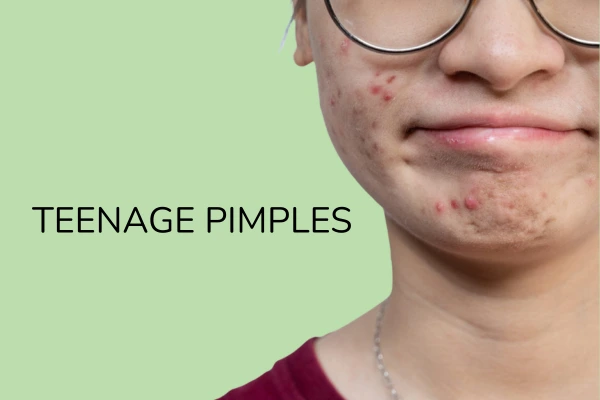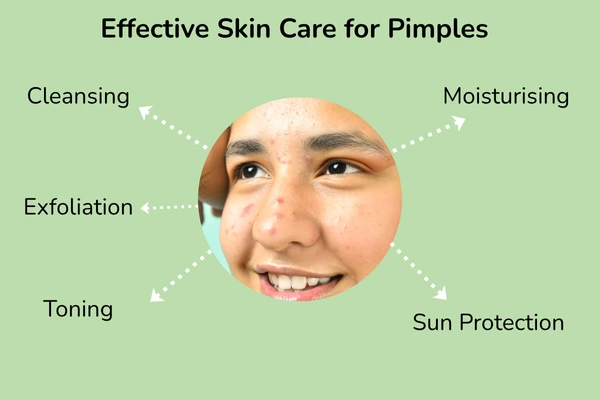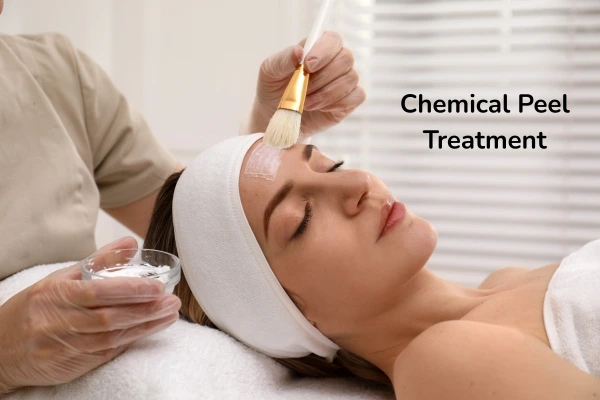Up to 25% OFF on Selected Treatments
-
Treatments
Acne and Scar
Pigmentation
Laser Hair Reduction
Dermato-surgery
Body
Anti Aging
Skin Rejuvenation
Others
- Clinics
- Blogs
Treatments
Dealing with teenage pimples can be an incredibly frustrating experience. The adolescent years are already challenging enough, and the addition of stubborn, unsightly pimples can significantly impact one’s self-esteem. If you’re looking for the teenage pimples best treatments, or trying to understand how to get rid of teenage pimples and how to prevent pimples for teenagers, you’re in the right place.
At Evenly Skin and Hair Clinic, we understand the nuances of teenage skin and offer comprehensive, medically-backed treatments to help you achieve clear, healthy skin. This blog aims to provide an in-depth understanding of skin care for pimples and highlight the best teenage pimples treatments available to combat teenage pimples effectively.

Teenage pimples, also known as acne vulgaris, primarily result from hormonal changes during puberty affecting millions of adolescents. As your body undergoes a growth spurt, androgen hormones stimulate sebaceous glands, leading to excess oil production and increased oil production. When combined with dead skin cells and bacteria, this leads to inflammation and the formation of pimples. Additionally, the skin cell turnover rate accelerates, contributing to clogged pores.
Common types of acne include:
Though genetics and hormones are major causes, factors like stress, oily hair products, and poor skincare can make things worse. That’s why it’s essential to find the best teenage pimples treatments early on.
Must Read: The Main Causes of Pimples on Face in Adults and How to Manage Acneic Skin
Treating teenage pimples requires a multi-faceted approach. It’s not just about reducing the pimples problem; it’s about addressing the root causes. To find the best teenage pimples treatments, a consistent skincare routine is essential:

A proper cleansing routine is the cornerstone of effective skincare for pimples. Use a gentle, non-comedogenic cleanser twice daily to remove dirt, excess oil, and makeup without stripping the skin of its natural moisture. Salicylic acid and benzoyl peroxide are effective ingredients in clearing pores and preventing acne breakouts. Using lukewarm water is ideal for cleansing, as hot water can irritate the skin.
Exfoliating once or twice a week with a mild exfoliant can remove dead skin cells and prevent clogged pores. However, avoid harsh scrubs that can irritate the skin. Opt for gentle exfoliants containing alpha hydroxy acids (AHAs) or beta hydroxy acids (BHAs) for effective results without irritation.
Apply an alcohol-free toner to balance the skin’s pH levels and remove any remaining impurities. Toners with ingredients like witch hazel or tea tree oil can be particularly beneficial for acne-prone skin.
Even oily skin needs hydration. Choose a lightweight, oil-free moisturiser to maintain skin hydration without clogging pores. Look for non-comedogenic products that won’t exacerbate acne.
Apply a broad-spectrum sunscreen with at least SPF 30 daily to protect the skin from harmful UV rays, which can worsen acne and lead to scarring. Opt for oil-free, non-comedogenic formulations to avoid clogging pores.
These steps are foundational for anyone exploring how to get rid of teenage pimples and maintain long term results. Now let’s look into the best teenage pimples treatments that actually works.
Must Read: How to get rid of adult pimples on face effectively: Causes & Treatments
To truly reduce breakouts and prevent scarring, teenagers often need more than home remedies. At Evenly Skin and Hair Clinic, we provide a range of dermatologist led teenage pimples best treatments to effectively manage and reduce teenage pimples.
Oral medications are another option. Antibiotics like doxycycline and minocycline can be prescribed for moderate to severe acne. For female patients, certain oral contraceptives can help regulate hormones that trigger acne. Isotretinoin, a powerful retinoid, is used for severe cystic acne that doesn’t respond to other treatments. However, it must be used under strict medical supervision due to potential side effects.
These professional-grade options represent the teenage pimples best treatments for faster, long-term results.
Chemical peels: Based on the severity, our specialists may recommend chemical peels with different strengths. These exfoliating treatments remove the top layer of skin, unclogging pores and improving skin texture, reducing the appearance of teenage pimples and acne scars. Common ingredients in these treatments include salicylic acid, glycolic acid, and lactic acid.

Must Read: Top 6 Chemical Peel Benefits for Radiant Skin
Extractions: A dermatologist can safely remove persistent blackheads and whiteheads using a specialised device to prevent further inflammation. It provides immediate relief and improves the skin’s appearance.
Hormonal treatment: For hormonal acne, birth control pills or anti-androgen medications may be prescribed.
By integrating these professional treatments with a consistent skincare routine, we can help you achieve clearer and healthier skin by get ridding the teenage pimples. To discover the best teenage pimples treatments, continue reading.
If you are seeking solutions on how to prevent pimples for teenagers, here are some dermatologist-recommended lifestyle tips:
For teens who want both prevention and treatment, combining these tips with the teenage pimples best treatments will deliver the best results.
While professional teenage pimples treatments are best and highly effective, certain home remedies can complement your skincare routine:
Teen acne can be stubborn, but with the right combination of skin care, lifestyle changes, and dermatologist-recommended treatments, clear skin is achievable. Whether you’re a teenager trying to manage breakouts or a parent looking for guidance, Evenly Clinic offers the best teenage pimples treatments in Bangalore to restore skin health and confidence.
Still wondering how to get rid of teenage pimples or need guidance on how to prevent pimples for teenagers? Our expert dermatologists are just one call away.
For health-related information, follow us on Instagram!!
Will my pimples go away on their own?
While acne often improves with time, it can leave scars if not properly treated. Consistent skin care and, in some cases, medical intervention can help clear acne and prevent scarring.
What causes teenage pimples?
Teenage pimples, or acne, are primarily caused by hormonal changes during puberty. Increased oil production, dead skin cells, and bacteria combine to clog pores, leading to pimples.
Can using too many skincare products cause acne?
Yes, overloading your skin with products can irritate it and worsen acne. Stick to a basic skincare routine with gentle, non-comedogenic products.
Should I use hot or cold water to wash my face?
Warm water is best. Hot water can strip your skin’s natural oils, while cold water might not effectively remove dirt and oil.
Can swimming in pool water cause acne?
Chlorine in pool water can be drying and irritating to the skin. Showering immediately after swimming can help remove chlorine residue.
How can I prevent acne scars?
Consistent treatment, avoiding popping pimples, and using sunscreen can help prevent acne scars.
How to get rid of teenage pimples naturally?
You can use aloe vera, tea tree oil, and green tea extracts. However, for lasting results, pair them with medically-approved acne treatments.
How to prevent pimples for teenagers with oily skin?
Use oil-free skincare products, avoid touching the face, eat clean, and maintain a consistent routine. Also, visit a dermatologist to personalise your plan.
We hope this information is helpful. If you have any skin and hair-related questions or would like to discuss personalized solutions, please reach out to us at 7337899030. Our team of experts is dedicated to providing personalized care that meets your unique needs. Take the first step towards a healthier, more confident you by scheduling a consultation with us today. Your journey to vibrant skin and stronger hair begins here.
Book an Appointment
Start your journey to healthy skin and hair today.
Leave a Comment